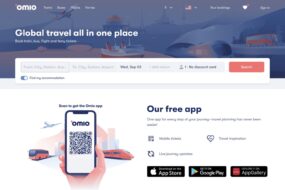
Introduction to Expedia and its history
Traveling has always been a favorite pastime for many, but the way we book our trips has transformed dramatically over the years. Enter Expedia, a game-changer in the travel industry that revolutionized how we plan our adventures. Founded in 1996 as a small division of Microsoft, it quickly evolved into one of the largest online travel agencies in the world.
From its early days to becoming a household name, Expedia’s journey is nothing short of fascinating. With just a few clicks, travelers can now explore exotic destinations, compare prices on flights and accommodations, and discover hidden gems—all thanks to this innovative platform. But how did it all begin? Let’s dive into the evolution of Expedia and see how it changed everything about traveling as we know it today.
Expedia’s emergence as a major player in the industry
Expedia burst onto the travel scene in 1996, changing everything. Originally a small division of Microsoft, it quickly took flight as an independent company. Its user-friendly platform attracted travelers eager for convenience and choice.
By offering competitive pricing and extensive options, Expedia positioned itself as a go-to resource. From flights to hotel bookings, consumers found they could plan their entire trip in one place.
The company’s aggressive marketing strategies also helped solidify its status. Partnerships with airlines and hotels expanded its reach, making it synonymous with online travel booking.
As more people turned to the internet for vacation planning, Expedia reigned supreme. It became evident that this was not just another website; it was revolutionizing how we explore the world.
Innovations and technology advancements by Expedia
Expedia has consistently pushed the envelope in travel technology. One of its standout innovations is the introduction of dynamic packaging. This feature allows users to combine flights, hotels, and rental cars into one seamless booking experience.
Mobile capabilities have also transformed how travelers plan their trips. The Expedia app offers personalized recommendations based on user preferences, streamlining decision-making for millions of travelers.
Moreover, artificial intelligence plays a significant role in enhancing customer service. Chatbots provide instant assistance while machine learning algorithms analyze trends to offer tailored deals.
Expedia’s commitment to integrating virtual reality lets customers explore destinations before they arrive. This immersive experience adds a new dimension to trip planning.
Each technological leap not only simplifies processes but also enriches the overall travel experience, making it more accessible than ever before.
Impact on the travel industry and consumer behavior
Expedia’s influence on the travel industry has been profound. It transformed how consumers approach booking trips, making it simpler and more accessible. Travelers can now compare prices, read reviews, and customize their itineraries with just a few clicks.
This convenience shifted consumer expectations dramatically. People seek instant gratification and transparency when planning their journeys. No longer willing to rely solely on travel agents, they prefer to take charge of their own arrangements.
Moreover, Expedia’s extensive marketing strategies have educated users about various options available in the market. This empowerment drives competition among service providers, leading to better deals for travelers.
As technology continues to evolve, so do consumer behaviors influenced by platforms like Expedia. The desire for personalization is stronger than ever; customers want unique experiences tailored just for them.

Challenges faced by Expedia and its response
Expedia has faced its fair share of challenges in the ever-evolving travel landscape. Intense competition from other online travel agencies and emerging platforms put pressure on their market dominance.
The rise of mobile apps transformed consumer preferences. Travelers now seek instant bookings and streamlined experiences, challenging Expedia to adapt quickly.
In response, they invested heavily in technology upgrades. Enhanced user interfaces and personalized recommendations became a priority to cater to changing demands.
Moreover, issues such as fluctuating prices and customer service complaints often arose. To tackle this, Expedia strengthened its support systems and increased transparency in pricing models.
Partnerships with airlines, hotels, and local businesses also expanded their offerings. This strategic approach aimed at enhancing value for customers while staying competitive in a crowded marketplace.
Future of Expedia and the travel industry
The future of Expedia looks promising as it adapts to a rapidly changing travel landscape. With increasing competition and evolving consumer preferences, innovation is key.
Artificial intelligence will play a significant role in personalizing customer experiences. Imagine tailored trip suggestions based on your past travels or even real-time adjustments during your journey.
Sustainability is another critical focus. As travelers become more eco-conscious, Expedia may prioritize partnerships with green hotels and promote carbon offset options for flights.
Additionally, the integration of virtual reality could transform how we explore destinations before booking. Virtual tours might become standard practice, letting travelers experience accommodations like never before.
Enhancing mobile capabilities will likely be crucial. Travelers often rely on their smartphones for planning and booking trips. A seamless app experience could redefine convenience in travel arrangements moving forward.
Conclusion
The story of Expedia is one of innovation and adaptation. From its humble beginnings as a small travel website, it has transformed into a leading force in the industry. The platform’s ability to embrace technology has set new standards for convenience and accessibility, revolutionizing how people plan their travels.
Expedia’s influence extends beyond just booking flights and hotels; it shaped consumer expectations around pricing transparency and customer service. As travelers increasingly rely on digital platforms for their journey planning, Expedia continues to evolve alongside them.
Despite facing numerous challenges—from increased competition to shifting market demands—Expedia remains steadfast in addressing these hurdles with agility. Its commitment to enhancing user experience ensures that it stays relevant in this fast-paced environment.
Looking ahead, the future of Expedia promises more exciting developments as technological advancements continue to unfold. With trends like artificial intelligence and personalized recommendations shaping travel experiences, there’s no doubt that Expedia will play a vital role in what lies ahead for both the company and the broader travel landscape.
As we reflect on its journey so far, it’s clear that Expedia will remain a key player as travelers navigate an ever-changing world. The evolution of this platform exemplifies not only changes within itself but also shifts within our collective approach to exploring the globe.







